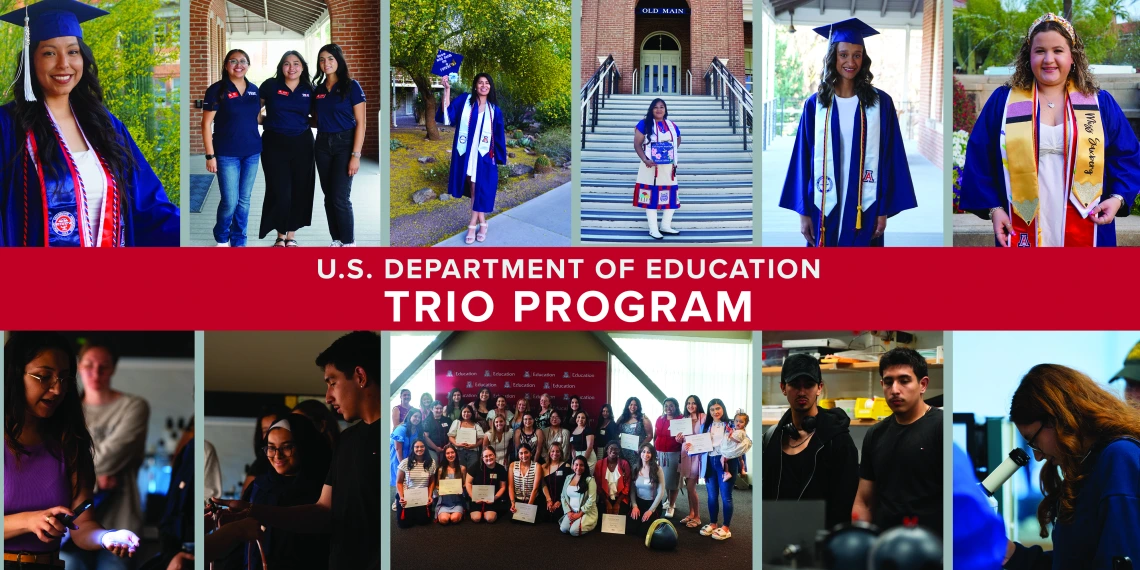The TRIO Impact
Longstanding federally funded programs help students reach academic goals

Image: TRIO participants at the U of A. Photos by Emilia Gazman (bottom, of individuals) and Heather Frankfort (top)
—TUCSON, AZ —
TRIO is a collection of federally funded programs administered by the U.S. Department of Education providing academic advising, mentoring, tutoring, financial literacy education, and career guidance. TRIO is designed to mitigate barriers to higher education through guidance with college preparation and motivation in the pursuit of a degree.
TRIO programs expand access to higher education for those who are the first in their families to attend college, come from limited-income backgrounds, or have disabilities. This could also include veterans, student-parents, or those from rural areas.
Since its establishment by Congress in 1965, TRIO has helped more than six million Americans earn college degrees. Trio programs are currently serving close to 900,000 middle school to college-going students in more than 2,800 programs across the country.
“TRIO helped me recognize that I belonged in college and that I was as good as everyone else. This may seem small, but for a first-generation student from a low-income family, it can make all the difference.” —Sara Chavarria, TRIO alumna and assistant dean for research, U of A College of Education
At the University of Arizona, five TRIO programs—Upward Bound, SSS Teacher Prep, Student Support Services , SSS STEM, and McNair Scholars—currently support 491 students with a combined investment of $1.4 million, or approximately $2,850 per student.
Three of the five TRIO programs at the U of A are approaching the end of their five-year funding cycle and are currently up for renewal. The outcomes are well-documented: improved college access, retention, graduation rates, and graduate school enrollment.
TRIO alumna and current Assistant Dean for Research in the U of A College of Education, Sara Chavarria, shared, “TRIO helped me recognize that I belonged in college and that I was as good as everyone else. This may seem small, but for a first-generation student from a low-income family, it can make all the difference.”
According to the 2023–2024 academic year performance report submitted to the U.S. Department of Education, U of A TRIO programs served as a catalyst for the following student impact:
• 100% of Upward Bound participants graduated from high school and enrolled in college
• 90% of students were in good academic standing
• 95% continued enrollment from one year to the next
• 81% completed their degree
• 69% enrolled in graduate school
The broader benefits of college attainment are clear. According to the Association of Public and Land-grant Universities, individuals with a bachelor’s degree earn an average of $1.2 million more over their lifetime than those with only a high school diploma (APLU). They are more likely to repay student loans, contribute to the tax base, and participate in the workforce sectors that need them most—science, healthcare, and education.
“TRIO is not only an access and retention initiative; it is a path to bigger dreams and possibilities.” —Judy Marquez Kiyama, TRIO alumna and U of A professor, Center for the Study of Higher Education
Yet, access remains unequal. Data from the National Center for Education Statistics (NCES, 2023) show that students from low-income families are 3.5 times less likely to attend college than those from higher-income households (28% vs. 78%). However, the U.S. needs students of every background who are academically prepared and motivated to achieve success and remain competitive with other nations.
TRIO programs are awarded through competitive federal grants, measured by performance benchmarks and evaluated regularly. Fatemma Soto-Herrera, program director and TRIO alumna, describes the model as efficient and collaborative: “TRIO doesn’t duplicate services; it coordinates them. Without this structure, we would need multiple new programs to deliver the same impact.”
Funding for TRIO programs is determined through the federal budget and appropriations process, which is currently underway for fiscal year 2026. The programs have historically received support from congressional champions on both sides of the aisle. During a recent committee hearing, Rep. Mike Simpson (R-Idaho) called TRIO “one of the most effective programs in the federal government,” comparing it to a modern-day GI Bill for under-resourced communities (Inside Higher Ed, May 21, 2025).
TRIO alumna and professor for the Center for the Study of Higher Education, Judy Marquez Kiyama believes that program outcomes reflect more than academic progress. “TRIO is not only an access and retention initiative; it is a path to bigger dreams and possibilities,” she said.

